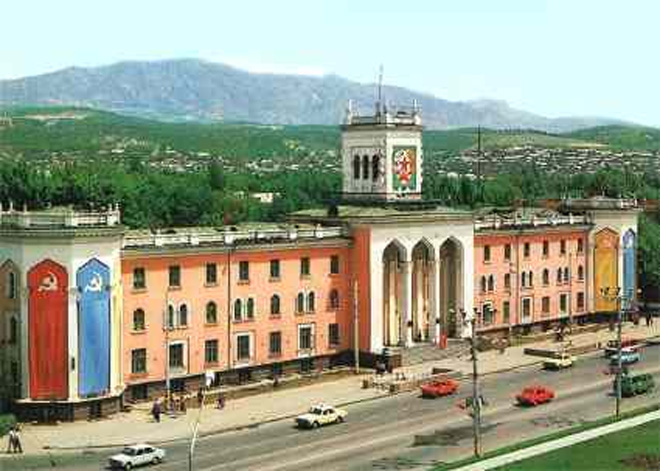Azerbaijan, Baku, July 31 / Trend , V.Zhavoronkova/
The negotiations between the Russian and Tajik Presidents, Dmitry Medvedev and Emomali Rahmon confirmed their interest in bilateral cooperation, Russian Expert on Central Asia, Leonid Gusev said.
On July 31, Medvedev arrived in Tajikistan for a two-day visit. The visit focused on a lot of topical issues.
A key issue disturbing Tajikistan is Russia's participation in the construction of new hydroelectric power stations in the country, said Gusev, Senior Research Fellow at the Institute of International Studies of the Russian Foreign Ministry's Moscow State Institute of International Relations.
He also believes Dushanbe would like to receive an economic aid from Russia: currently the situation in the country is that a few days ago, President Rahmon addressed to citizens to prepare stockpiles of food for at least two years.
"During this visit, the president attended the opening ceremony of the Sangtudin hydro power station (HPS) on the Vakhsh river, but as to construction of new hydro power stations, Moscow does not want to promise, at least for the foreseeable future," the Candidate of Historical Sciences Gusev wrote to Trend in an email.
The station is part of the cascade hydropower stations of the four blocks on the Vakhsh river and its design capacity is 670 MW. The cost of hydro power station is valued at $600 million. Some 66.39 percent of the authorized capital of Sangtudin HPS -1 Open Joint Stock Company (OJSC) belongs to Russia and 16.45 percent to Tajikistan.
One of disputable issues was the price at which Tajikistan will buy energy from the hydro power station.
Russia has offered 1 kW hour for 3 cents, but Tajikistan objected, because the price for its population in Tajikistan is 1.2 cents per 1 kW hour, said Gusev.
It was possible to compromise, he said: the price will be less than demanded by Russia and it has not yet been definitively determined, but it was limited for about 15 years, and then it can be increased.
Moreover, Tajikistan wants to offer Russia three more new projects of construction of hydro power stations with an average capacity, including the Obburdan, Yavraz and Urfatin, said Gusev.
Tajikistan, he said, concerned that Russia has taken part in other major projects, namely the construction of the Rogun hydro power station under the international consortium.
"But Russia has postponed its participation in the construction of the 347-meter-high Rogun hydro power station to indefinite time," said Gusev.
The expert believes it has been done for the following reasons: Uzbekistan strongly objects building a station, as it fears that construction would lead to environmental disaster for the river water passing through its territory, but also seriously reduce the water in the country.
During a visit to Tashkent in early 2009, the Russian President said it is necessary to "take into account the interests of neighboring states," and assured that such stations will not be built without the consent of the neighboring countries.
The Tajik President was very offended by this statement, and wanted to postpone its participation in the CSTO and EurAsEC summits, but then everything changed, and attended them.
Gusev said in order to further attract Moscow's attention, last week the Tajik President submitted a bill on "State language" to the parliament, in which there is no concept of the "language of internationnal communication". This status is enshrined for the Russian language in the existing law.
"During the talks, where the issue on the hydro power station was solved, a compromise on the language was immediately found. The Tajik Foreign Ministry explained that in Tajikistan, the role of the Russian language as the language of international communication was enshrined in the second article of the Constitution and nobody is going to change it," the political analyst said.
The parties have considered the issues on the operation of the 201 Russian military base in Tajikistan. The presidents tasked to continue to work together to develop comprehensive proposals regarding the further development of the equal Russian-Tajik military cooperation, including the operation of the base.
Thus, Gusev believes, the parties confirmed their interest in bilateral cooperation.
The Central Asian region in general and Tajikistan in particular are very important for Russia, says the expert, and at present there is a struggle amongst the United States, Russia, China and the European Union in the region.
There are many reasons, says Gusev, primarily because the region is rich in minerals, such as hydrocarbons, and uranium.
Their deposits are in Tajikistan. In addition, the way to South Asia passes via these countries. The expert believes not by accident, the presidents of Afghanistan and Pakistan attended the meeting with Medvedev in Tajikistan.
Moreover, the strategically important Aini airfield is in Tajikistan.
Russia, the United States and India are interested in its purchase, he said.
"Tajikistan is bordered by China, and if the U.S. gets the airfield, for example, it will give them the extra opportunity to control a greater or lesser extent the territory of China," said Gusev.
In addition, there is the problem of drug trafficking, says expert.
Heroin flows pass to the north and then to Russia via Tajikistan from Afghanistan.
"If it is not stopped, this will simply cover Russia," said Gusev.
Do you have any feedback? Contact our journalist at [email protected]






